10 common diseases in children in the fall, symptoms and prevention
Bronchitis, respiratory infections, flu, typhus . are some of the young diseases often acquired in the fall. Mothers need to know how to prevent and treat children to protect their health during the season.
Because the weather in this season is always changing, cold, sunny and dark days create favorable conditions for bacteria to grow. But young children have low resistance, so the incidence is higher.
Here are the symptoms and how to prevent 10 easy-to-catch young illnesses in the fall that mothers should know.
1. Flu in children

Symptom.
- A mild fever.
- Nasal congestion, runny nose.
- Sore throat, cough, sneeze.
- Whole body aches.
Prevention
- Keep children warm when the weather changes, especially important places like feet, hands, chest, neck and head.
- Limit your child's exposure to many people, especially those with signs of flu.
- Give your baby warm water, avoid eating foods directly from the refrigerator, ice cream, ice.
- Increasing resistance for children to parents should increase nutrition and vitamin C, give your baby enough water to drink.
- Flu shots should be given to babies over 6 months of age once a year.
- Keep baby and environment clean.
2. Pinkeye
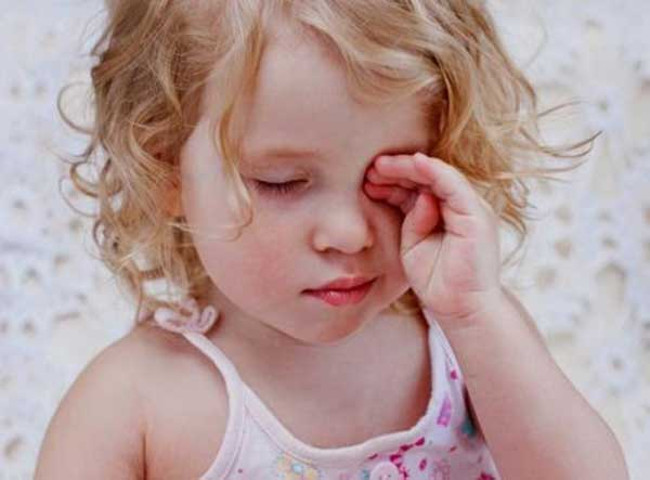
Symptom
- Red eyes, eyelid swelling and pain and excessive tearing.
Prevention.
- Clean personal hygiene, regularly wash your hands with soap.
- Limit contact with people with eye pain.
- Use towels, pillows, and washbasin separately.Regularly wash and dry in the sun.
- Clean the house.
Note : If your child has pinkeye, you should take your child to the doctor to find out the cause and the most effective treatment.
3. Fever fever
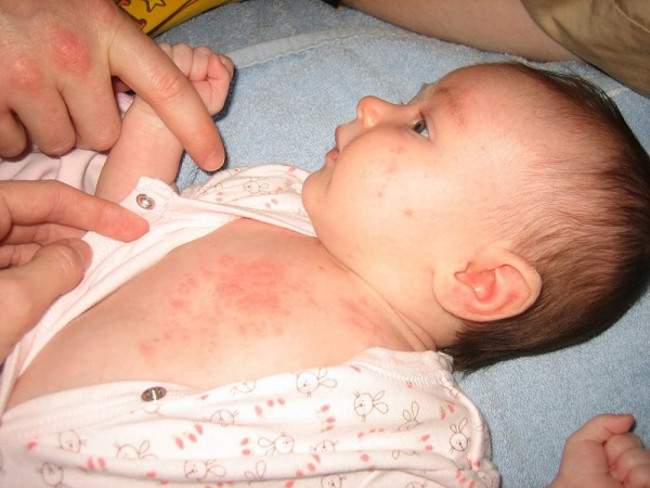
Baby rash is usually caused by measles virus or rubella virus. This is a respiratory disease, when the child breathes in the same source of air with the sick person.
Symptom.
- Fever, fatigue, headache, runny nose, sore throat, mucous membranes of the throat .
- Baby skin will appear red rashes spread throughout the body
- Located near the neck, the baby's ears will appear two swollen and painful lymph nodes.
Prevention.
- Measles and rubella vaccination according to the national expanded vaccination program.
How to care for a child with typhus
- Proper antipyretic: If the fever is 38 ° C, give Paracetamol antipyretic medication to a single dose of 10-15mg / kg weight, every 4-6 hours.Cool your child with warm water as needed to avoid complications of high fever in children.
- Reduce cough, relieve sore throat: Give children cough medicines with herbal origin such as thick leaf vegetables, congee with alum sugar, ginger steamed honey .
- Clearing the baby's nose with dilute saline water and soft tissue: helps children to eat and breastfeed easily
- Reasonable diet: Offer children liquid, nutritious, easy to digest, drink more water than fresh fruit juices to ensure adequate supply of vitamins, improve resistance.
- Keep your skin clean and dry: clean your child every day, avoid being cold.
4. Inflammation of the respiratory tract in children
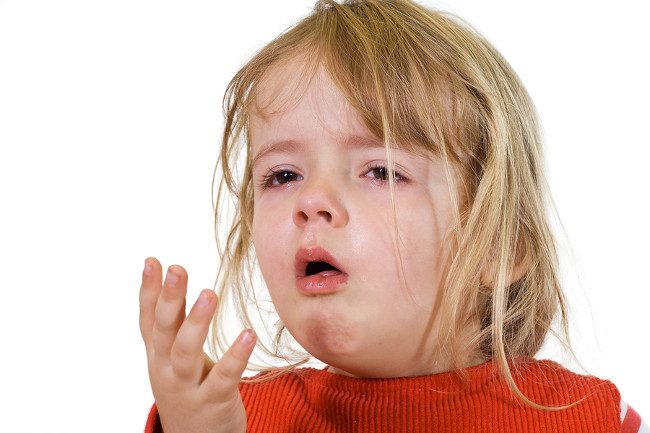
The disease is transmitted by mouth, saliva, hand contact and eating utensils.
Symptom
- Cough, sore throat.
- Fever, headache.
- Breathe fast, winged nose swells.
- Anorexia, mild diarrhea.
- The chest is concave when breathing in.
How to prevent acute respiratory infections in children
- Wash your baby with regular soap.
- Keep your baby warm.
- Wear a baby mask when going to the street.
- Avoid exposing your baby to cigarette smoke.
- Adequate nutrient supplement for the baby.
5. Young ear infections
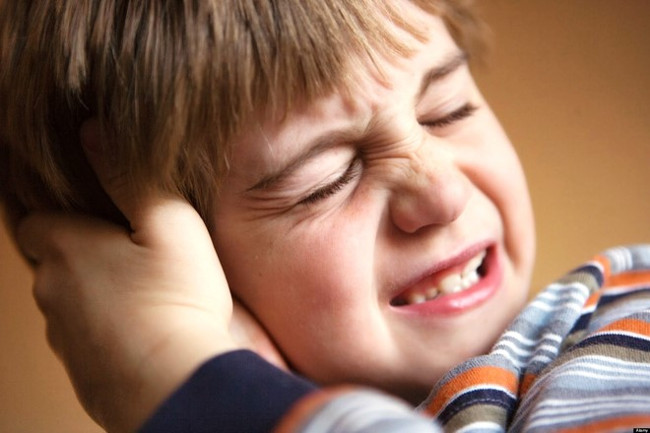
Symptom:
- Too much crying.
- High fever, headache.
- Lactation, poor appetite, vomiting.
- Gastrointestinal disorders, eating without pepper, go outside loose stools several times a day.
- Earache, uncomfortable.
- Do not react when there is noise.
- When the illness is severe, the discharge of the ear will appear and the above symptoms will gradually decrease.
Prevention
- Keep the ears, nose, and throat clean and clean for children
- Keep children warm, away from contaminated environments and cigarette smoke
- Respiratory diseases if not treated thoroughly can easily cause otitis media.Therefore, it should be cured if the child has respiratory problems.
- Use cotton swabs and physiological saline to clean your baby's ears
6. Dengue fever
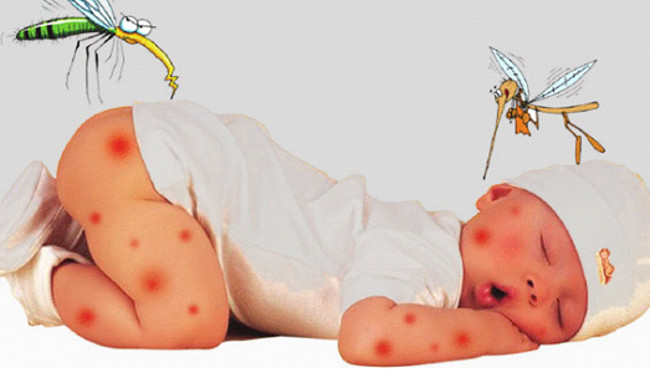
This is an acute infectious disease, children aged 3 to 10 years are the most susceptible to disease.
Symptom
- Baby sudden high fever.
- Out of blood.
- There may be abdominal pain, severe pain, pain in the right lower quadrant
- Occurrence of subcutaneous hemorrhage appears to be scattered, may hemorrhage in the oral mucosa.
- Epistaxis
Prevention
- Avoid mosquito bites: wear long clothes, do not leave children in dark, damp places.
- Kill mosquitoes: bush bushes, clean and cool houses, spray mosquito repellent .
7. Diarrhea in children
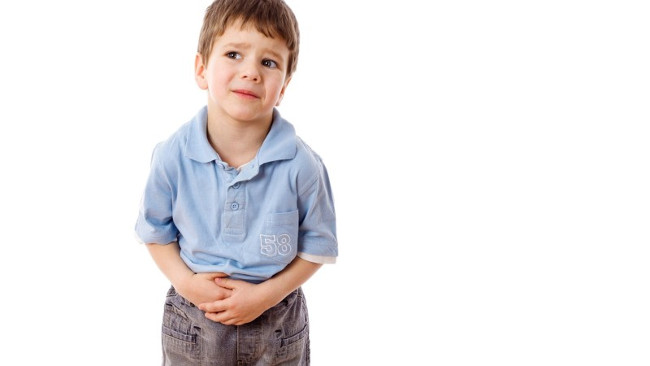
Diarrhea in children if not treated promptly can lead to dangerous complications.
Symptom
- Nausea and vomiting after 1 or 2 days go outside.
- Liquid stools, watery, many times a day can be from 10 to 15 times / day, smell sour, feces can be mucus, in case of dysentery, there will be water mixed with blood.
- Poor eating and anorexia
- Can cough, fever.
- Children are very thirsty.
Prevention
- Take your baby to get the vaccine.
- Be sure to clean your baby: wash your hands before eating and after using the toilet.
- Make sure your child "eats, drinks boiling".
- Avoid contact with pets like dogs and cats.
- Enhance your baby's immune system.
8. Bronchitis
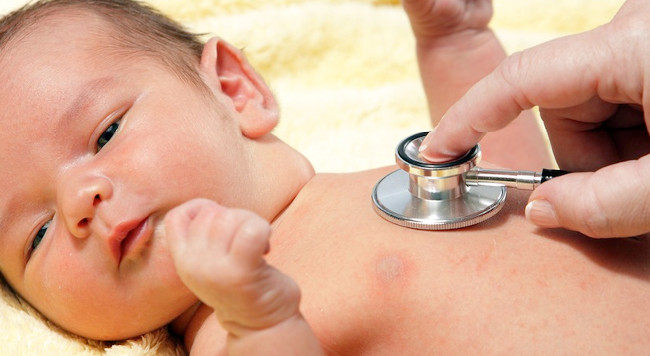
Bronchitis is spread from person to person by direct contact with the nasal and throat fluids of people carrying the virus.
Symptom
- Cough a lot.
- Fever lasts for 2-3 weeks.
- Quit eating, vomiting back.
- Rapid breathing, difficulty breathing, recessing the concave chest, nasal wing swelling.
- Purple skin.
Prevention
- Increasing resistance for children: eat enough nutrients, supplement vitamin c .
- Clean the ears, nose and throat.
- Avoid kissing children, wash your hands with soap when taking care of children.
- Vaccinate children in accordance with regulations.
- Do not give your child access to people who have a runny nose or share other baby's devices.
- Avoid exposing your baby to tobacco smoke and toxic chemicals.
- Wash blankets, pillows for children often, then dry them in the sun.
9. Chickenpox
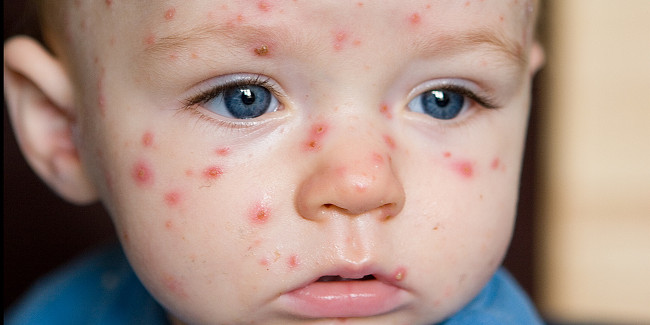
This is a common disease in young children. Respiratory diseases.
Symptom
- Fever, headache, muscle aches, .
- Occurrence of rash spots, burns water, . After 2-3 days, acne can be scabbed.
Prevention
- Get vaccinated for chicken pox.
- All children aged 12-18 months are given 1 shot.
- Children from 19 months old to 13 years old who have never had chickenpox every time, once.
- Children over 13 years of age and adults who have never had chickenpox should be vaccinated twice, repeated 4-8 weeks apart.
10. Mumps

Symptom
- Cough, high fever for about 3 to 4 days.
- Testicular pain, solid touch (in boys), lower abdominal pain (in girls).
- Fatigue, headache, earache, fear of the wind.
- A cheek swells up and gradually spreads to the other side.
- The area is swollen but there is no redness, pain but no pus.
Prevention
- Vaccination: children 12 months and older can vaccinate.
- Enhance your child's immune system: eat enough food, drink plenty of water, eat lots of fruit .
- Keeping the house clean.
- Clean the baby's body, especially the respiratory tract, to avoid infection.
- Keep your body warm and wear a dust mask for your baby.
Note : Mumps is caused by a virus so there is no specific treatment but only treatment for symptoms such as fever relief, pain relief .
Can warm the parotid gland to reduce the pain of the baby; dental care for babies; Give your baby liquid, easy to digest foods and many nutrients to increase the body's resistance.
You should read it
- ★ What is the world in the eyes of young children under one year old?
- ★ How to choose air conditioners for homes with young children
- ★ How to prevent cough in children
- ★ The danger when saying 'Be careful' to young children that parents need to pay attention to!
- ★ Children with sinusitis, pneumonia are at risk of asthma after adulthood